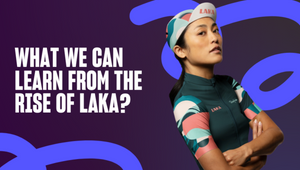
Prevention Revolution

The UK healthcare system is confronting unprecedented challenges due to an ageing population and a surge in health issues. Concurrently, there's a growing interest in health discussions both mental and physical, yet, people struggle with effective strategies for change.
The solution could lie in an innovative digital approach already at our fingertips. Digital technology could be a game-changer that offers the elusive promise of tackling the root cause, not just the conditions themselves.
The fact we are facing a serious challenge is unarguable. An ageing population and a lower birth rate are transforming the population pyramid with a declining population to support them. The proportion of people aged over 65 has increased from 16.4% to 18.6% in the last decade alone.
This is compounded by a significant health crisis on our hands. More than 15 million people, 30% of the UK population, are living with one or more long-term conditions.
How digital technology can be of service
While our screen addiction is a cause for alarm with social media arguably exacerbating mental health problems for many, it could also offer hope as a saviour in the battle for better health and wellbeing.
After all, everyone has a phone and everyone is on that phone for long periods of time (users in the UK spend an average of 2hrs 55mins per day on their desktops, and 2hrs 52mins per day on their mobile devices). So, how can we nudge people to focus on things that will make the greatest difference to their health and wellbeing?
This trend seemed to reach its nadir during the pandemic, with live experiences curtailed and digital burnout very real. Limited real-world interaction sparked a desire for authentic experiences across demographics. This is evident in the vinyl resurgence, with UK sales experiencing their fastest growth this decade (11.7% in 2023), and the mindfulness trend, reflecting a collective yearning to be present.
The dawn of the experience age
As our collective hard drive has reached capacity in this information-driven era, we are seeing a shift into a new era, ‘the experience age’. The premise of this is a move from seeing knowledge as value to experience as value. Unlike the information age, where the emphasis was primarily on the dissemination of knowledge, ‘the experience age’ places paramount importance on the quality of interactions and engagements.
For brands and businesses, it is not just about delivering a product or service; it's about crafting an experience that resonates with customers on a deeper level and stands out from the mass of increasingly low-grade information and experiences we are subjected to. There are a series of trends both behavioural and technological that are causing this.
The toll of the information age is leading to a desire for change
Unhappiness is rising across the world, fuelled by digital overload. Gallup produce an annual global update on the negative and positive experiences that people have daily and has found a steadily rising trend in negative emotions such as stress, sadness, anger and worry. Several studies have shown a correlating link to strain, burnout and various health complaints.
Beyond Stuff: The Rise of Experiences and Self-Discovery
A shift in priorities is driving a surge in personal development. Many people are increasingly seeking happiness through experiences and self-growth, recognising the limitations of chasing it through ever-growing consumption. This is reflected in the over 40% of adults actively using self-help materials, indicating a move towards inner fulfilment over material possessions.
This heightened awareness extends to the environment. The era of rampant consumption, fuelled by the information age and globalisation, has undeniably shrunk the world – but at a cost. We're more aware than ever of the damage we've caused to the planet's resources.
Social sharing fuelling the trend
The ascent of experience has also chimed with the maturing of social media platforms. Social sharing fuels experience with consumers sharing their experiences with friends and followers online. This creates a powerful form of word-of-mouth marketing, further amplifying the value of positive experiences. A report by BrandBastion found that consumers are more likely to post about good experiences (53%) than bad ones (35%) on social media platforms, heightening the incentive to focus on compelling experiences.
A new era of data privacy as power shifts towards consumers
While the popularity of social media platforms shows no sign of waning, people are more conscious of their value and less willing to provide data to platforms, without there being a better value exchange. The emergence of web 3.0 and new tracking laws means they expect to keep better hold of their own data and meaning companies need to work harder and provide better experiences in order to truly engage them.
I believe we are going to see a shift of company valuation away from the information/data they collect, to the experience they create and deliver. This is being forced by principles and consumer trends around people rather than companies owning their data.
AI Revolution: Personalised Experiences & The Future of Engagement
The future holds the tantalising promise of AI tailoring truly personalised digital experiences, freeing consumers to enjoy both digital and in-person interactions. After all, this game-changing technology boasts a far greater capacity for information consumption and utilisation than humans.
We are starting to see the first signs of this impact in the form of declining university submissions. According to UCAS data, the application rate for UK 18-year-olds has fallen for three consecutive years. In 2024, it reached its lowest level since before the pandemic at 41.3%. This indicates a shift in younger generations - realising life experiences are more important than rote knowledge.
Coupled with emerging augmented and virtual reality technologies, AI unlocks avenues for immersive experiences, emphasising the urgency for businesses and brands to adapt and avoid becoming irrelevant.
Technology acts as a bridge, granting access to once-unattainable experiences. However, the transition between technology and the real world must be seamless and frictionless. With this context in mind, the question arises: how can brands and businesses design experiences that unify the online and offline world? In the next blog post, we'll delve into strategies for brands to thrive in this new era.













